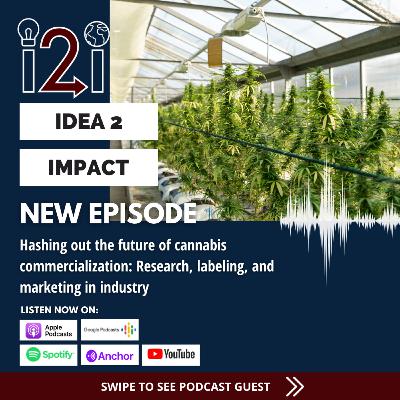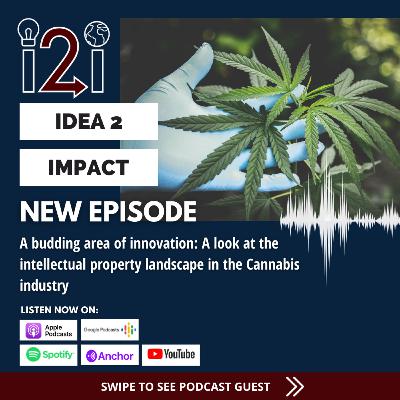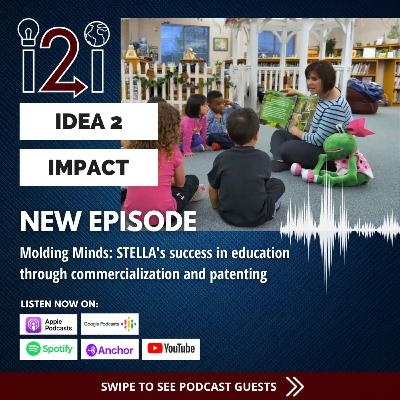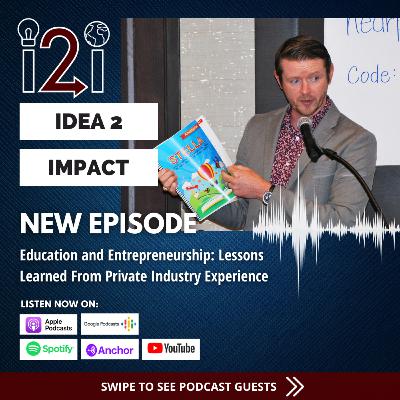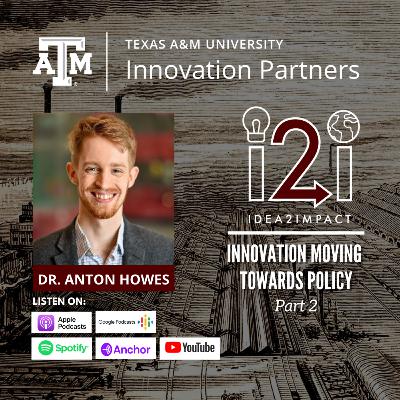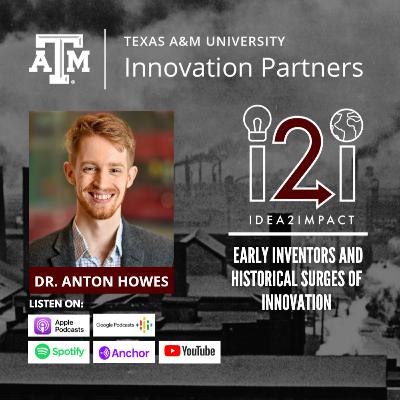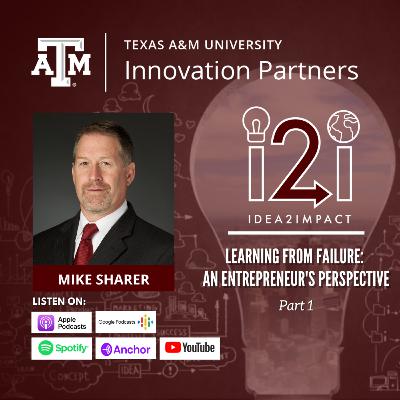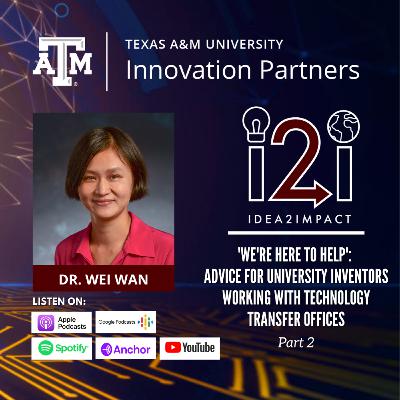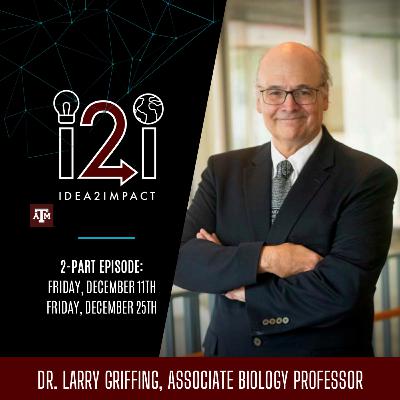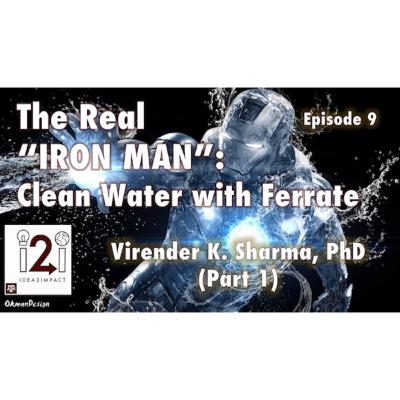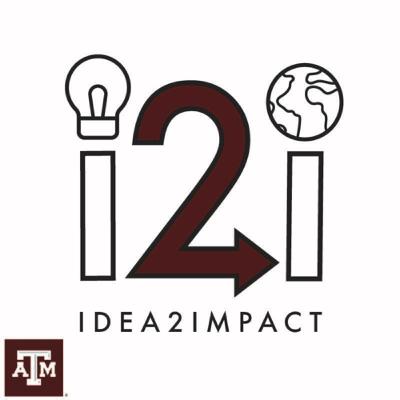Discover Idea 2 Impact
Idea 2 Impact

Idea 2 Impact
Author: Texas A&M University Innovation Partners
Subscribed: 1Played: 5Subscribe
Share
© Texas A&M University Innovation Partners
Description
Ever wonder how people are able to shift their ideas that originate on paper into real-life inventions that changed the world? Who are these inventors? How are they able to transfer their ideas to impact the world? Join co-hosts Beth Deuermeyer and Jack Manhire on the Idea 2 Impact podcast, presented by Texas A&M University Innovation Partners, where we bring you the inside scoop on how faculty and other community members successfully translate their ideas into inventions, while also teaching, researching, and mentoring other faculty members and students.
25 Episodes
Reverse
In this episode, Jack & Beth continue their conversation with Dr. Stacey Mitchell and her expertise in the field of forensic nursing. Mitchell dives into using VR simulation for evidence collection and how Texas A&M University's Visualization department has been developing the software and creating it to be as authentic as possible. Mitchell's work at the Center of Excellence for Forensic Nursing, under the School of Nursing, has stood out among other universities, offering the best place to learn about forensic nursing. Mitchell discusses the importance of copyrighting the material to best represent and protect the Texas A&M brand and the work they do. Mitchell dives into rapid cycle quality improvement (RCQI) and how any successful program needs to constantly evaluate how each piece works and what else they need to do to improve. The second half of the conversation explores Mitchell's path to forensic nursing, providing care for different demographics, and legal consulting. Mitchell explains what they must collect and how to preserve it, as well as diving into the legal side with the mock testimony course that helps victims experince a court room. This episode wraps up with Jack, Beth, & Stacey reflecting on how real life is not just textbook material, so interactive programs contribute greatly to shaping education.
For more information on the Center of Excellence in Forensic Nursing, visit https://nursing.tamu.edu/cefn/index.html.
In this week's episode, Jack and Beth talk with Dr. Stacey Mitchell from the Center of Excellence in Forensic Nursing. Dr. Mitchell came to TAMU after many years working for hospitals and hospital systems. She shares how she came to be interested in forensic nursing which eventually lead to her becoming one of the leading experts in sexual assault nurse examinations. We wrap up the first of two episodes with Dr. Mitchell discussing how she has used federal funding to help launch and continuouly fund the research that comes out of the Center for Exccellence in Forensic Nursing. Make sure to join us for part 2 in a few weeks! For more information on the Center of Excellence in Forensic Nursing, visit https://nursing.tamu.edu/cefn/index.html.
In episode 2, Lance continues the conversation about IP in the cannabis industry. Jack and Beth highlight how Colarado, a state where cannabis is legal, utilizes the plant for innovation. The trio examines gene editing, FDA procedures, gut biology, and the more biological standpoint for examining cannabis. Lance explains the progression of university research and how that alongside celebrity endorsements and incorporating other industries has an impact on the market effect of cannabis. The conversation comes full circle, with Beth, Jack, and Lance discussing how commercial activity and research puts products in the hands of the people and how Innovation Partners can aid in grants, innovative leaders, and commercializing even the most taboo of innovations.
Beth and Jack speak with Lance Anderson, an IP attorney at Dickson and Wright LLP. In this episode, we talk about Lance ended up in the IP world with a background in agriculture, how his college's tech transfer office helped him, and his time as a law student. This episode dives into how advancing opportunities require more than just a good idea and how commercialization is required for the biggest impact in today's world. Additionally, Anderson discusses his work as an IP attorney with a focus on patenting and commercializing for marijuana related inventions and research. We discuss the cannabis industry, legalization, and how intellectual property works in the cannabi industry. From black market growers to the process works within states that have legalized cannabis to the two prong system that defines the industry, Anderson dives into the IP and commercialization of cannabis inventions around the U.S.
In episode 2, Beth and Jack continue their conversation with Dr. Etchells and Dr. Lara-Alecio. They dive into the STELLA program, covering it's success as a dual-literacy program for young children and how it works so effectively. Learn more about how STELLA truly went from idea to impact on this episode.
In this episode, Jack and Beth talk with Dr. Matthew Etchells and Dr. Rafael Lara-Alecio about the cross roads of education and commercialization. They discuss STELLA, a program that was developed by CRDLLA and which Innovation Partners helped to license with Frog Street LLC. Dr. Lara-Alecio and Dr. Etchells share how their backgrounds in private industry have shaped their perspectives on research and commercialization, and how commercializing inventions leads to a bigger impact. This episode dives into the impact of education and how it can shape ideas and reach the greatest audience through commercialization.
For more information on CRDLLA, please visit https://crdlla.tamu.edu
In episode 2, our conversation with Anton Howes continues. We dive further into the type of thinking it takes to be an inventor and look at the inventors and innovative thinkers that helped start, and ultimately, led to the Industrial Revolution. We explore policy and the policy recommendations that might come out of Howes' work.
This week Beth and Jack talk to Dr. Anton Howes who specializes in the study of invention. Anton’s research explores why inventors become innovators, focusing on the lives of the individual innovators who made Britain’s Industrial Revolution happen. Dr. Howes has written several papers and is the author of Arts and Minds, which tells the study of Britain’s subscription-funded national improvement agency, the Royal Society for the Encouragement of Arts. Give this episode a listen to find out one thing many inventors have in common. It may not be what you think! To read more of Anton’s research, subscribe to his blog ‘Age of Invention: The Industry of All Nations’ by going to https://antonhowes.substack.com.
In part 2 of our conversation with Michael Sharer, we disucss Texas A&M Innovation Partner's Translational Investment Fund (TIF), market analysis, and resources avaliable for inventors at different stages. Dr. Sharer explains how TIF offers early stage technologies an opportunity to advance in the market, and further explains the importance of tech transfer offices for the advancement of university technology.
For more information on the Translational Investment Fund, or Texas A&M University Innovation Partners, please visit www.tamuip.tamu.edu.
In this episode, we delve into the importance of failure in entrepreneurship and how we can learn from it. Associate Vice President for Commercialization, Michael “Mike” Sharer discusses the importance of entrepreneurial training for graduate students and post-doctoral researchers. We start out with discussing Mike’s experience in industry prior to moving to Texas, and how he plans to help Innovation Partners continue to grow here at Texas A&M. Mike shares where his interest in innovation sparked from, the importance of researchers knowing about intellectual property, and the multi-faceted knowledge that gives you a head start in commercialization of inventions.
For more information on technology transfer and commercialization at Texas A&M University, please visit www.tamuip.tamu.edu.
In part 2 of our conversation with Dr. Wei Wan, we discuss specifically the technology transfer process here at Texas A&M. Dr. Wan gives advice to inventors in different stages, from graduate students to seasoned tenured faculty members. She argues for why faculty should be interested in commercialization regardless of whether they are interested in getting their ideas to the market, and discusses how Innovation Partners or other technology transfer offices can help with the process to make it seem less daunting and overwhelming. If you're curious about how licensing managers move ideas from disclosures to the marketplace, you won't want to miss this episode! Head to www.tamuip.edu to learn more about Innovation Partners.
With over 20 years of experience as a university researcher and professor, Wei Wan’s journey to technology transfer and patenting is filled with change, challenge, and passion. In this episode, Wei Wan discusses her background in biology and how her research ultimately led her to taking the patent bar and becoming a patent agent. Now a senior licensing manager at Texas A&M Innovation Partners, Wan shares not only how she ended up where she is, but how Innovation Partners can help other inventors and entrepreneurs patent their technologies.
Dr. Larry Griffing continues to find new technologies to improve his environment through his research. In this episode, we learn about his i-Corps program and his Innovation X Grant that teaches students about herbicides and biology as well as commercialization and the process that goes behind it.
For more information on Innovation[X], please visit https://innovation.tamu.edu/collaborate/innovation-x/
In this two-part episode, hosts Beth Deuermeyer and Jack Manhire sit down with Dr. Larry Griffing from the Department of Biology here at Texas A&M University. We discuss his research interests, Robert Hook, and his research with the endoplasmic reticulum. You may be asking yourself what these things have in common, but you will have to listen to find out. We also discuss his Innovation[X] project where he addresses the question, "How is a discovery in basic science translated into a product that can potentially be used for the general good, while also providing a large profit?". For more episodes, or information on how you can submit an Innovation[X] proposal, visit the Innovation Partners website.
Dr.Virender Sharma is dedicated to saving lives and helping others, so his approach to his technology is done selflessly. Dr. Sharma works as a consultant for the business that markets his technology while also continuing to do his work at Texas A&M. In this episode, he discusses why it is important to get your research out there, and he doesn't just mean through publications. Sharma, the “Real Iron Man” represents public health well, working hard to help those in need, especially during a time of great need. To learn more about the work Sharma does, listen to Idea 2 Impact or visit https://public-health.tamu.edu/directory/sharma.html
Dr. Virender Sharma is a professor in environmental and occupational health, as well as a chemist and entrepreneur. With his interest in chemistry starting at a young age, Sharma has been dedicated to scientific research to help other people for a long time. In this episode, we explore Sharma’s research and development of oxidants and hydroxy radicals, how he took an initial confusing product of research and used it to help the environment, and his new technology, which takes “electron-hungry” molecules close to pollutants and it works to destroy the pollutant. More than that, Sharma’s technology can be used as a disinfectant, water purifier, wound treatment, and even as a golf course treatment.
Available technology: Activated Ferrate Solution as a Surface and Water Disinfectant and Oxidant
Links to some of Dr. Sharma's research:
Ferrate (VI) pretreatment before disinfection: An effective approach to controlling unsaturated and aromatic halo-disinfection byproducts in chlorinated and chloraminated drinking waters
Inactivation of Murine Norovirus and Fecal Coliforms by Ferrate(VI) in Secondary Effluent Wastewater
Find out more about the Texas New Ventures Competition at http://www.TexasNVC.org
Chris Scotti is a serial entrepreneur and long-time supporter of the innovation ecosystem in Texas. He has over 25 years of experience founding, growing and coaching emerging technology companies through relationships with private businesses and economic development organizations, as well as government and higher education institutions. Scotti’s biggest strength is the ability to play in both the technical and business worlds, and act as a connector between the two.
Scotti is a frequent speaker to students and faculty at Texas A&M University about entrepreneurship and raising capital. He also is a regular judge, panelist, and mentor in entrepreneur and emerging technology focused state and national events. Scotti has a history as both an elected official and entrepreneur, and is dedicated to helping coach companies and foster the entrepreneurial ecosystem in Aggieland and Texas as a whole.
Chris Scotti is a serial entrepreneur and long-time supporter of the innovation ecosystem in Texas. He has over 25 years of experience founding, growing and coaching emerging technology companies through relationships with private businesses and economic development organizations, as well as government and higher education institutions. Scotti’s biggest strength is the ability to play in both the technical and business worlds, and act as a connector between the two.
Scotti is a frequent speaker to students and faculty at Texas A&M University about entrepreneurship and raising capital. He also is a regular judge, panelist, and mentor in entrepreneur and emerging technology focused state and national events. Scotti has a history as both an elected official and entrepreneur, and is dedicated to helping coach companies and foster the entrepreneurial ecosystem in Aggieland and Texas as a whole.
#vaccine #orphandisease #orphandrug #FDAapproval
Part 2 of 2. You can find Part 1 here: https://anchor.fm/idea-to-impact/episodes/Ep--5-Why-it-takes-so-long-to-approve-vaccines-and-other-drugs-ejpcmj
Dr. Thomas Kent who is the Robert H. Welch Chair Professor at Texas A&M’s Institute of Biosciences and Technology, or IBT as we call it, down in Houston, is our guest this afternoon. You will find out as you listen today that Dr. Kent’s story is unique to his area--he is a neurologist, specifically vascular neurology, as well as a teacher and researcher. Because he is working with drugs that will actually be used or injected into the human, the idea to impact journey can be a long one. In today's episode we continue to discuss Dr. Kent's work, and the complexities of getting a drug onto the shelf in your pharmacy.
Dr. Kent’s basic science research is exploring the mechanisms by which stroke and neurodegeneration cause their injuries and create new therapies employing carbon-based nanomaterials. His laboratory has a major focus on commercialization with several patents granted and pending. This nanomedicine program has garnered nearly $7 million in federal funding and he is actively involved with private investment toward commercialization. Dr. Kent’s NIH-funded clinical research involves precision medicine to identify differences in the response to stroke therapies based on race and sex in collaboration with Morehouse School of Medicine. This research is important because of the high burden of stroke in the African American community and the “stroke belt” of the Southern US. He is also funded by the State of Texas Lone Star Stroke consortium, a network of the major Texas academic Neurology departments, to study ways of providing better access to stroke prevention in underserved, rural and resource poor urban regions.
You will find out as you listen today that Dr. Thomas Kent’s story is unique to his area--he is a neurologist, specifically vascular neurology, as well as a teacher and researcher. BEcause he is working with drugs that will actually be used or injected into the human, the idea to impact journey can be a long one.
Thomas Kent, MD, is the Robert H. Welch Chair Professor at Texas A&M’s Institute of Biosciences and Technology (IBT). Dr. Kent’s basic science research is exploring the mechanisms by which stroke and neurodegeneration cause their injuries and create new therapies employing carbon-based nanomaterials. His laboratory has a major focus on commercialization with several patents granted and pending. This nanomedicine program has garnered nearly $7 million in federal funding and he is actively involved with private investment toward commercialization. Dr. Kent’s NIH-funded clinical research involves precision medicine to identify differences in the response to stroke therapies based on race and sex in collaboration with Morehouse School of Medicine. This research is important because of the high burden of stroke in the African American community and the “stroke belt” of the Southern US. He is also funded by the State of Texas Lone Star Stroke consortium, a network of the major Texas academic Neurology departments, to study ways of providing better access to stroke prevention in underserved, rural and resource poor urban regions.




